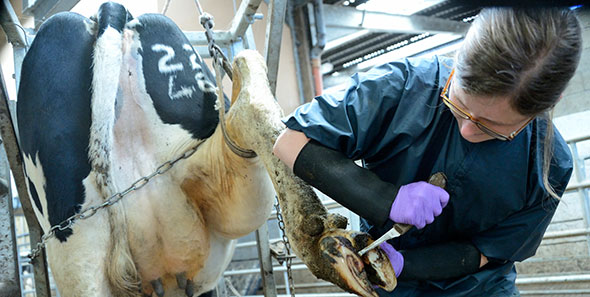JCTS Farm Animal Health and Production
Aim
The Junior Clinical Training Scholarship in farm animal provides an opportunity for new or recently qualified veterinary graduates to obtain high-quality, post-graduate training in farm animal medicine and surgery. The emphasis of this programme will be on gaining practical clinical experience all aspects of farm animal health and production, with particular emphasis on ruminant species. The programme will allow the Scholar to identify specific fields of farm animal work in which to specialise, either in preparation for Senior Clinical Training Scholarship programmes (residencies), or in specialist private farm animal practice. The Scholarship fulfils European College specialism intern requirements.
The scholarship programme will cover:-
• Case management of individual production animals, including emergency and critical care, surgery, anaesthesia, diagnostics, internal medicine and obstetrics.
• Involvement in a busy and expanding first opinion farm animal practice
• Training and practice in population medicine and herd health management, with an emphasis on evidence base medicine
• Experience in teaching and communication
• Basic tuition in research methods and scientific writing.
• Opportunity to design and undertake research projects.
Programme duration
12 months, subject to the satisfactory completion of an initial 3-month monitoring period.
Summary of programme
The programme will start with a short induction period to explain details of clinical working practices and policy, including briefing on when to seek assistance and from whom.
The programme will be focused around the clinical activities of Cambridge Farm Animal Veterinary Services. Initially, training will concentrate on clinical skills, to bring the JCTS up to a reasonable level of competency in individual animal diagnosis, fertility and ultrasound scanning and foot trimming and locomotion assessment. The full range of skills necessary for farm animal work, including regulatory matters, referral letters, prescriptions and case notes will be included.
The programme over 12 months will include all aspects of production animal health management including calf health and young-stock, mastitis and milk quality, nutrition and health, sheep health and production, use and analysis of health and production records, beef health and production and infectious disease investigations. There will be an emphasis on using detailed computerised data from modern dairies to improve herd health and management.
Hospitalised animals will be assigned to the JCTS, when appropriate, who will be responsible for clinical examination and diagnostic and therapeutic procedures. This will be under the close supervision and guidance of a senior clinical member of staff. Exposure to medicine, orthopaedics, surgery, diagnostic imaging, anaesthesia, neurology and pathology form important components of the training programme.
The JCTS will be expected to take part in case rounds, to attend formal seminars and to take part in clinical rounds/journal clubs in the appropriate disciplines. The JCTS will be expected to undertake a clinical/research project for submission as a BCVA or CVS clinical abstract. In the final three months of the programme, the JCTS will give a presentation to clinical staff on a case or case series that has attracted their special interest.

